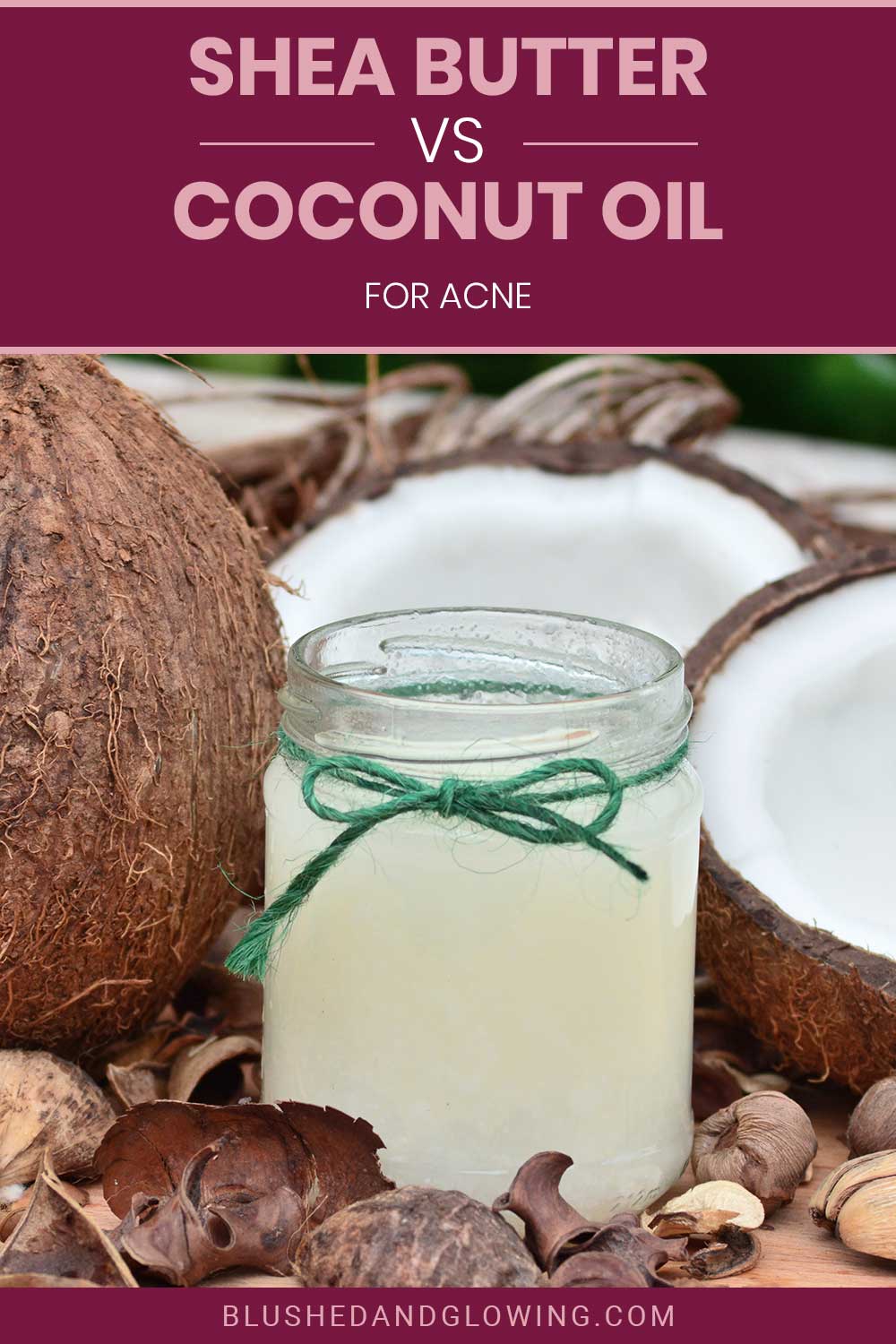Shea Butter Vs Coconut Oil for Acne
We may earn commissions for purchases made through links on our site. Learn more on our about us page.
Both shea butter and coconut oil are said to have numerous benefits for the skin, including moisturizing, soothing, and potentially helping to fight acne.
In this article, we’re going to take a closer look at both of them concerning acne and explore their individual properties and potential benefits for your skin.
We hope that once the article is done, you’ll be better equipped to make the right decision for you and your skin care needs.

What are the Similarities?
Shea butter and coconut oil, when it comes to treating acne, have a lot of things in common. Both of these hours are known for moisturizing, which can help hydrate the skin, preventing dryness and irritation that can exacerbate acne.
Along with this, they also share these similarities:
- Contain anti-inflammatory and antibacterial properties
- Each can help fade acne scars and marks due to the vitamin E levels
What are the Differences?
Now that you understand the major similarities, let’s take a look at some of the notable differences. The biggest difference may be the consistency and texture. Shea butter is a thicker heavy oil that can feel a bit greasy on the skin.
On the other hand, coconut oil is lighter and more easily absorbed. This can mean that shea butter may be better suited for those with dry or flaky skin, while coconut oil may be better for those with oily or combination skin.
Along with that difference, there are a couple of others of note:
- The fatty acid composition of these oils differs.
- Some people may be allergic or sensitive to one of these oils, while the other works perfectly fine for the skin.
- Some may also find that using naturals alone is not enough to fully treat their acne.
Pros & Cons: Shea Butter vs. Coconut Oil for Acne
Shea butter and coconut are both natural herbs that have been touted for their potential benefits in treating acne. Here are some of the pros and cons of using each oil:
Shea Butter
Pros:
- High in vitamin E, which can help reduce the appearance of acne scars and blemishes
- Contains anti-inflammatory properties that can help to soothe and calm irritated skin
- Has moisturizing properties that can help to prevent dryness and flakiness
- It may be helpful for those with dry or sensitive skin
Cons:
- It is heavier and can potentially clog pores
- It may not be suitable for those with oily or acne-prone skin
- Has a thick and greasy texture that some people may not cure
Coconut Oil
Pros:
- Contains lauric acid, which has antibacterial properties
- Easily absorbed into the skin, making an option for those with oil or combination skin
- Moisturizing properties that can prevent dryness and flakiness
- Able to be used as a natural makeup remover
Cons:
- It may not be suitable for those with dry or sensitive skin
- It can be comedogenic for some individuals
- It may not be as effective at reducing the appearance of acne scars and blemishes
Which One Has More Natural Ingredients?
For eco-conscious people who want to only utilize natural skin care ingredients, the importance of having more natural ingredients is understandable. Shea butter and coconut are great options for treating acne and are natural.
However, if you’re looking for skin products, the higher percentage dash ingredients, shea butter, maybe the better choice.
Shea butter is derived from the nuts of the shade tree and is minimally processed to retain its natural properties. This is typically made up of around 90% fatty acids, with the remainder consisting of vitamins, minerals, and other natural compounds.
This means that shea butter is a highly natural ingredient that can provide a range of benefits for the skin. Coconut oil is also natural, and it is extracted from the meat of coconuts and undergoes more processing though. This means that it loses a little bit in the transition.
Which One Is More Versatile?
Where shea butter may hedge out coconut oil when it comes to being a natural ingredient, coconut oil is more versatile than shea butter. One of the main reasons for this is that coconut oil is a lightweight texture and can be absorbed into the skin more quickly.
This makes it a great option for a variety of skin care applications, including moisturizers, makeup removers, hair conditioners, and body scrubs. However, shea butter is heavier, as we’ve said, and may not be as versatile.
Overall both shea butter and coconut oil have their unique benefits. However, it may be more versatile than the two due to its lightweight texture and ability to be used for various skin care applications, not just for acne.
Final Thoughts on Shea Butter Vs. Coconut Oil for Acne
In the end, the best choice for you will depend on your skin type and needs. It’s always good to test out both oils and see which one works best for you.
By incorporating natural oils interesting to retain, you can help nourish and care for your skin gently and effectively. We hope all the information we have given you has helped you decide which option is best for you.



Leave a Reply